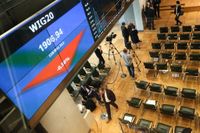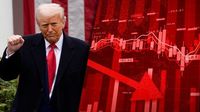On Monday, April 7, 2025, the Polish stock exchange, known as the GPW, opened with a significant sell-off, marking a challenging start to the week for investors. The WIG20 index, a key indicator of the market's health, plummeted by over 6 percent shortly after trading began, reflecting a broader trend of declining stock values across Europe and Asia.
As the session progressed, the WIG20 index initially fell by more than 6.6 percent before recovering slightly to a loss of 4.9 percent by 10:15 AM. Despite this minor rebound, the index was still approaching a critical level of 2300 points, a threshold that analysts are closely monitoring. The overall sentiment in the market was grim, with nearly 280 companies, or about 85 percent of those listed on the Warsaw Stock Exchange, reporting losses. The banking sector, in particular, bore the brunt of the downturn, with shares of major banks like Alior Bank suffering a decline of nearly 9 percent.
In addition to the local market's struggles, European indices were also in the red. The pan-European Stoxx 600 index was down approximately 6 percent, while Germany's DAX index experienced a staggering drop of over 9.5 percent during early trading hours. This wave of sell-offs in Europe follows a particularly tumultuous week, where markets had already been under pressure from a variety of factors, including fears of economic instability and geopolitical tensions.
Analyst Marcin Mierzwa from Stooq.pl noted that the WIG20 index had fallen approximately 10 percent over the last two days of the previous week, marking the worst performance since February 24, 2022. This downturn is reminiscent of the market turbulence experienced during the COVID-19 pandemic, as investors appeared to be reacting to a mix of global economic uncertainty and local market pressures.
The declines were not limited to Poland. In Asia, the stock market experienced its largest crash since 2008, with major indices like the Nikkei 225 and Topix losing over 8 percent. After trading resumed in Tokyo, the Nikkei index fell by more than 6 percent, prompting concerns about the stability of global markets. Meanwhile, in Australia, the S&P/ASX 200 index dropped by 5.3 percent, and even cryptocurrencies like Bitcoin were not spared, suffering a 5.6 percent decline.
As the week progressed, the sentiment remained bearish. On Sunday, President Donald Trump addressed the stock market situation, denying claims that his policies were aimed at causing a market crash. Despite his reassurances, the market continued to react negatively to the high tariffs imposed on U.S. trade partners, which are set to take effect on April 9, 2025. The tariffs, which include a 10 percent increase that went into effect on April 5, have raised concerns about their potential impact on economic growth and investor confidence.
In light of these developments, analysts are warning that the WIG20 index could fall to the 2100-point level if it breaches the critical support level around 2400 points. Mierzwa highlighted that the index's performance over the past week has been alarming, as it has retraced about half of its gains since November of the previous year. The situation poses a significant challenge for bullish investors, who are now facing a market environment characterized by volatility and uncertainty.
The ramifications of these market movements extend beyond Poland, signaling a potential shift in global economic dynamics. As investors grapple with fears of recession and the implications of ongoing trade disputes, the financial landscape is becoming increasingly precarious. The sell-offs reflect a broader sentiment of caution, as many market participants are reevaluating their strategies in light of the current climate.
In Europe, the sell-off has been described as a "bloody morning" by Jacek Rzeźniczek of Stooq.pl, who noted that the situation has escalated to levels not seen in years. The DAX futures have exceeded a 6 percent decline, and the overall atmosphere in European markets is one of heightened anxiety. With the combination of geopolitical tensions, rising inflation, and uncertainty surrounding monetary policy, investors are left wondering how long this trend will continue.
As the week unfolds, all eyes will be on the upcoming economic indicators and corporate earnings reports, which may provide further insight into the health of the global economy. The potential for a prolonged downturn looms large, and market participants are bracing themselves for what could be a turbulent period ahead.
In summary, the Polish stock exchange's sharp declines on April 7, 2025, are part of a larger pattern of sell-offs affecting global markets. With significant losses reported across various sectors and indices, investors are left navigating a landscape filled with uncertainty and volatility. As analysts continue to monitor the situation closely, the focus remains on how economic factors and political decisions will shape the future of financial markets.








